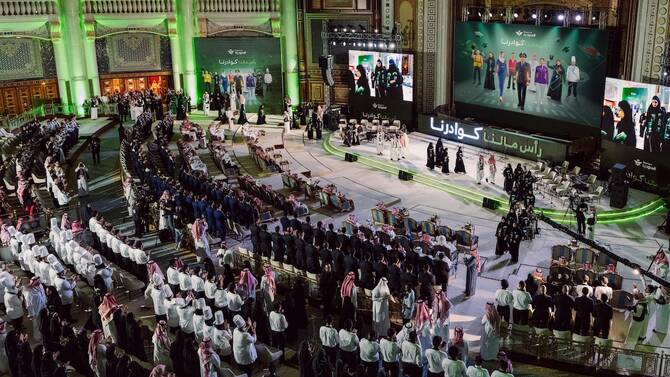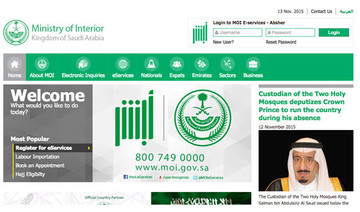JEDDAH: Absher, the interactive online platform provided by the Saudi Interior Ministry, served 18.3 million users in the past year, according to ministry statistics.
Since its launch in 2009/2010 it has answered 1.2 billion queries from registered users, at a rate of 120 million queries a year, the figures reveal. It was also used to perform 300 million transactions, approximately 30 million a year.
The online Absher service was introduced to increase productivity and promote more efficient work practices within government departments, while raising customer satisfaction levels. A smartphone app was added in 2015.
The platform provides access to 280 services provided by the Ministry of Interior to users in three categories: Individuals, business and government. It can be used to apply for jobs and Hajj permits, update passport information, make appointments, renew IDs and drivers’ licenses, register vehicles and pay traffic fines, among many other things. The services its provides are available to residents as well as
citizens; they can use it to renew residency permits and apply for visas, for example.
Absher is credited with improving life in Saudi Arabia by making it much easier for citizens and residents to interact with government departments to obtain information and complete required procedures and paperwork from the comfort of their own homes.
It has also made it easier for people to resolve potentially serious and costly problems.
For example, father-of-five Abdul Aziz Hazmi, was in the UK for a work assignment three years ago while two of his daughters remained in Jeddah. They were due to visit him when a problem cropped up at the airport.
“Back then they needed my permission on the app to travel back and forth, and without Absher they wouldn’t have been able to come and visit us,” he said. “I thought I’d already set those travel options for them when I did it for their siblings, but one of my daughters called me before boarding the plane panicking about not being allowed on.”
Hazmi told his daughter not to worry and reassured her that he would sort the problem out through the Absher app. Sure enough, four minutes later the girls were able to board the flight.
“Though they don’t need that service anymore, Absher still saves a lot of time and energy,” said Hazmi. “Renewing our national IDs and passports is the best feature. I used to dread the crowds at the application centers. I’d have to excuse myself for an entire day from work just to get my passport renewed.”
Waad Baleegh, a 24-year-old from Jeddah, also likes the fact that Absher streamlines and speeds up the provision of services such as the renewal of ID cards.
“I book my appointments through the app and print everything beforehand, and when I go to receive my new ID card there’s very little communication,” she said. “It gets things done so swiftly and easily.”
The Interior Ministry is participating this week in GITEX Technology Week in Dubai, where they are showcasing Absher, which was the first e-government platform in the Kingdom.
The ministry’s plans include the further development of e-government services into a “smart government” system that uses the power of artificial intelligence to help achieve the goals of Saudi Vision 2030.
18m used Saudi Arabia’s Absher services last year
https://arab.news/83fw2
18m used Saudi Arabia’s Absher services last year

- The platform provides access to 280 services provided by the Ministry of Interior
Saudia Group graduates 1,200 aviation trainees at landmark ceremony

- ‘This opportunity felt like a dream,’ culinary arts student says
- ‘Human capital remains our most important investment,’ transport minister says
JEDDAH: Saudia Group held its first unified graduation ceremony for trainees of its aviation programs on Saturday, marking one of the largest such events ever held in the Kingdom’s aviation sector.
The ceremony, in Jeddah, brought together more than 1,200 students who had completed specialized training programs and will now join the company’s workforce.
Mohammed Midher, a 32-year-old captain and graduate of the six-month aerospace engineering program, told Arab News: “Every difficulty becomes easy with hard work and dedication.
“I am very happy to graduate and grateful for this valuable opportunity provided by the Saudia Group.
“It was a chance to prove our skills and capabilities and we will be starting our jobs soon. I am very excited to lead the aircraft to destinations around the world.”
Nesreen Jomaa, a graduate of the Culinary Arts Academy’s one-year ZDAK program, said the training enhanced her professional growth.
“I already had experience in culinary arts and had worked in several hotels in Jeddah, so I came in with strong knowledge.
“This opportunity felt like a dream because it guarantees employment upon completion. It added so much to my professional growth and I also gained many wonderful friends within this field.”
Ashwaq Khaja, who completed the same program, said: “I am proud to be Saudi and proud of everything the group has provided for us.
“I have a bachelor’s degree in science management and I am a visual artist. Today, I aspire to combine visual art with culinary art. I am truly grateful for this opportunity.”
All of the training programs were delivered by Saudia Group and its subsidiaries, Saudia, Saudia Academy, Saudia Technic, Saudi Ground Services, SAL Saudi Logistics Services, flyadeal and Catrion.
The graduates will now take up operational roles in flight operations, ground services, engineering, logistics and customer-facing functions.
The students’ families were present at the graduation event and there was also a performance by a Saudi choral group.
The ceremony also celebrated the first Saudi female graduates in airport aircraft maintenance, with 25 women completing the training program.
Women were also represented in inflight services and onboard chef programs, reflecting their broader inclusion across all disciplines.
“The percentage of women in aviation is increasing year after year,” said Khaled Tash, chief marketing officer of Saudia Group.
“There is no program today from which women are excluded. Every program is open and women are fully enabled and encouraged to join.
“Over the years, we have celebrated ordering new aircraft, building new airports, expanding logistics and investing in infrastructure. But there is nothing we can be more proud of than ensuring we have the right people to lead these growth projects.”
The event was held under the patronage of Saleh Al-Jasser, minister of transport and logistics services, and attended by Ibrahim Al-Omar, director general of Saudia Group, alongside senior officials and aviation sector representatives.
“Developing national talent is fundamental to achieving the ambitions of the National Aviation Strategy,” Al-Jasser said.
“Graduating more than 1,000 aviation professionals in a single year reflects the scale and pace of transformation underway across the Kingdom’s transport and logistics sector.
“Human capital remains our most important investment as we build a globally competitive aviation ecosystem.”
Al-Omar highlighted the company’s progress in localizing roles.
“Saudia Group has made significant progress in localizing critical aviation roles, surpassing targeted performance indicators by margins ranging from 43 percent to 230 percent,” he said.
“We have also embedded knowledge transfer requirements into our agreements with global manufacturers to ensure the development of Saudi capabilities within the Kingdom.
“The next phase of our transformation, particularly as we elevate the guest experience and strengthen global competitiveness, depends on continued investment in specialized national talent.”
The event highlighted the diversity of career paths within the aviation sector, bringing together graduates from operations, maintenance, engineering, cabin services and ground services within an integrated training ecosystem addressing the sector’s full range of needs.
The group has also increased local content levels across its activities from 19 percent in 2019 to 29 percent in 2023, reinforcing its contribution to domestic economic development.














